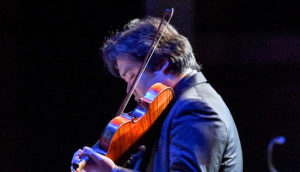NACO and Alexander Shelley end their season this week by pairing two heroically themed works by outsized personalities: Beethoven’s Emperor Piano Concerto No. 5, and Richard Strauss’ thinly disguised self-tribute, Ein Heldenleben. The concert was also a parting gift for the NAC’s retiring CEO, Peter Herrndorf.
Pianist Emanuel Ax’s demeanour is more avuncular than imperial. His relaxed, relentlessly cheerful disposition contradicts every stereotype of the high-strung virtuoso. If you were expecting a statement-making Emperor that took big interpretive risks, Ax would not have been your man Wednesday night. What he delivered instead was a commanding sense of the concerto’s grandeur and majesty, combined with a painter’s instinct for tone, light, and colour.
Ax is one of the only pianists I’ve heard who can successfully create the illusion that those flaring, opening arpeggios from the piano emerge straight out of the orchestral chord. His peerless gifts as a chamber and collaborative musician allow him to match and blend the piano’s sound to different instruments, such as the solo bassoon or horn, or pizzicato strings. Pianissimi were impossibly fragile, contrasting with burly, Joe Frazier left hook octaves.
A cell phone would have to go off right at the quietest moment of the Adagio. Shelley set a restrained, reverential mood with the introduction, while maintaining the forward impulsion. The Rondo had a robust, satisfying swing. The piano’s rallentando before the final flourish, in tandem with timpanist Feza Zweifel, was tight and effective.
As an encore, Ax offered a disarmingly sentimental rendition of Chopin’s F sharp major Nocturne.

Yosuke Kawasaki. Photo: Fred Cattroll
In the second half came Strauss’ Heldenleben, the autobiographical tone poem in which the composer claims the titular “hero” is by no means him (spoiler: it is). Shelley gave a masterfully detailed performance with a clear narrative arc. The work’s charmingly inflated ego was treated with affection and indulgence, not irony. There was humour, even a little exaggeration, but never ridicule.
The extra-large orchestra, with its eight horns, three bassoons, two tubas and I don’t know how many flutes, sounded luxe and gleaming. It was interesting to hear how much better the balance was for the home team than it had been for the equally king-size Toronto Symphony last week. Strings were meltingly tender and sensual, woodwinds sniped with appropriate snark and mockery. Only the expanded horn section sounded a little woolly and frayed at times, most noticeably in their declaration of the swashbuckling Don Juan theme.
Concertmaster Yosuke Kawasaki, who is so free and passionate in the leader’s chair, can sometimes sound tense in big solo moments. This wasn’t the case Wednesday with the epic solo violin part Strauss wrote to depict his capricious, eccentric, but adoring wife Pauline, with whom he was besotted. Kawasaki’s characterization transcended the technical demands of the music, evoking Pauline’s wit and flirtatious charm as well her legendary temper. He was the true hero of the night, and deserved every shouted bravo.
The concert repeats Thursday.







